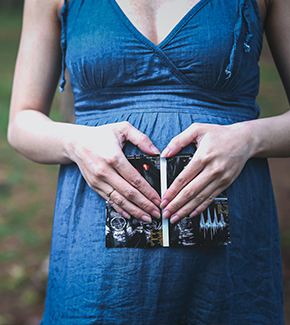Finding out you’re pregnant is one of life’s most exciting — and emotional — moments. Yet, the early weeks often come with uncertainty and lots of questions. One of the most common is: “When can I have an early pregnancy scan?”
At ReproScan, we understand how important it is to see that first glimpse of your baby and gain reassurance that everything is progressing as it should. This guide explains when you can have an early pregnancy scan in Ireland, what you can expect at 6–10 weeks, and why ReproScan’s approach focuses on both clarity and compassion.
What Is an Early Pregnancy Scan?
An early pregnancy scan (sometimes called a viability scan) is an ultrasound performed during the first trimester, before your hospital dating scan. It helps confirm that your pregnancy is developing normally and provides valuable reassurance in the early weeks.
Unlike hospital scans, which are usually scheduled between 11 and 13 weeks, an early scan gives you an opportunity to check in sooner often easing anxiety while providing important medical insight.
When Can You Have an Early Pregnancy Scan at ReproScan?
At ReproScan, we offer early pregnancy scans from 6 weeks gestation onward. That timing is deliberate, it’s when we can usually detect key details, such as:
- The gestational sac (the first visible structure in the uterus)
- The yolk sac (which nourishes the embryo)
- The embryo or fetal pole
- And, in most cases, a heartbeat
Before 6 weeks, these features are typically too small to visualise accurately, and scanning earlier can often lead to unnecessary worry or uncertainty. By waiting until at least 6 weeks, we can provide more definitive information and a more reassuring experience.
What You’ll See on a Scan at 6, 7, 8, 9 and 10 Weeks
Every pregnancy develops at its own pace, but here’s a general guide to what can be seen on an ultrasound between 6 and 10 weeks.
| Weeks | What You Can Expect to See | What the Scan Can Tell You |
| 6 weeks |
Gestational sac, yolk sac, and often the first glimpse of the embryo; a heartbeat may be visible |
Confirms the pregnancy is in the uterus and developing as expected |
| 7 weeks |
Clearer embryo and heartbeat, more defined structures |
Confirms viability, allows initial measurement of embryo (crown-rump length) |
| 8–9 weeks |
Well-formed embryo, stronger heartbeat |
Enables more accurate dating of the pregnancy |
| 10 weeks |
Baby and heartbeat are clearly visible |
Reassures normal development and confirms gestational age before your hospital scan |
Each week brings greater clarity, both visually and emotionally. That’s why our sonographers always explain exactly what’s visible and what it means for your stage of pregnancy.
Why 6 Weeks Is the Right Time to Start
Many people wonder: Why can’t I come in earlier?
The reason is simple before 6 weeks, it’s usually too early to see what we need to confirm viability. The embryo is often just a few millimetres in size, and a heartbeat may not yet be detectable. Scanning too early can lead to inconclusive results, which can cause unnecessary anxiety and a need for repeat visits.
By starting scans from 6 weeks, we strike the right balance between providing reassurance as early as possible and ensuring there’s enough visible detail to give meaningful results.
What Happens During Your Early Pregnancy Scan Appointment
Your early pregnancy scan at ReproScan is designed to be comfortable, clear, and supportive. Here’s what to expect:
- Welcome & registration
- Consultation
The sonographer will discuss your pregnancy timeline, any symptoms you’ve had, and what you hope to learn from the scan. - The scan itself
- Early scans (6–8 weeks) are usually performed transvaginally. This allows for better image quality and clearer detail. (Requires an empty bladder)
- Later scans (8–10 weeks) may be done abdominally, depending on visibility. (Requires a comfortably full bladder)
- Review of findings
We’ll explain everything we see from the gestational sac and yolk sac to the presence of a heartbeat. If anything is unclear, we’ll recommend a follow-up scan rather than leaving you uncertain. - Images & report
You’ll receive printed and digital copies of your scan images and a detailed report for your own records or to share with your GP or midwife.
The whole appointment typically takes 20–30 minutes, and you’ll never feel rushed.
What Can Influence What We See
It’s important to remember that every pregnancy develops differently. A few factors can affect what’s visible on an early pregnancy scan:
- Timing of ovulation or implantation: Even a few days’ variation can shift what we see.
- Position of the uterus or embryo: Sometimes the embryo is in a position that makes it harder to visualise early on.
- Maternal anatomy: Everyone’s body is unique, and some scans take a little longer to capture clearly.
- Transvaginal vs abdominal scans: Transvaginal scans provide higher resolution in early pregnancy.
Our sonographers are highly trained to interpret these variations and will always explain what’s happening with clarity and compassion.
Seeing Your Baby’s Heartbeat: What to Expect
The most emotional moment of an early scan is often seeing (and sometimes hearing) your baby’s heartbeat for the first time.
A heartbeat can usually be detected from around 6 to 7 weeks gestation. It’s one of the strongest signs of a healthy, developing pregnancy. If you’re scanned right at 6 weeks and the heartbeat isn’t visible yet, don’t panic it can simply be that it’s a few days too early. We’ll advise when to return for a follow-up if needed.
When to Consider an Early Pregnancy Scan
While many parents choose an early pregnancy scan simply for reassurance, there are also medical reasons why your GP or consultant may recommend one. These include:
- Uncertain or irregular menstrual cycles
- Previous miscarriage or ectopic pregnancy
- Pelvic pain or bleeding
- Fertility treatment pregnancies
- High anxiety or need for reassurance
Regardless of the reason, our focus is the same: to give you accurate information and emotional support in a calm, professional environment.
If the Scan Raises Concerns
Sometimes, an early scan might not show everything as expected. This doesn’t always mean something is wrong it could simply be too early, or your dates might be slightly off.
If the findings are uncertain, we may recommend:
- A repeat scan in 7–10 days to check for development
- Blood tests (such as hCG levels) through your GP
- Referral for further care if needed
We’ll always communicate clearly, answer every question, and make sure you feel supported at every stage.
Emotional Reassurance During the Early Weeks
The first trimester can be a rollercoaster physically, mentally, and emotionally. It’s completely normal to feel a mix of excitement, nervousness, and even fear.
At ReproScan, our team understands that this scan isn’t just about medical data; it’s about connection, reassurance, and peace of mind. We’ll take the time to explain everything clearly, so you leave knowing where you stand and what comes next.
Preparing for Your Early Pregnancy Scan
A few tips to help your appointment go smoothly:
- Book your scan once you’re at least 6 weeks pregnant.
You can calculate this based on the first day of your last menstrual period (LMP). - Arrive a few minutes early to complete any forms.
- Empty your bladder before a transvaginal scan (for better comfort and image clarity).
- Bring your partner or a support person if you wish you’re welcome to share this special moment.
FAQs
Can I have a scan before 6 weeks?
At ReproScan, we perform early pregnancy scans from 6 weeks onward. Scanning earlier is unlikely to show a heartbeat or clear structures, so we wait until 6 weeks to ensure the results are meaningful and reassuring.
How soon will I see a heartbeat?
Usually around 6 to 7 weeks, though it can vary slightly.
Will it be covered by health insurance?
Some private health insurers may reimburse part of the cost. Check your individual policy for details.
Do I need a referral from my GP?
No you can book directly with us online.
Can I get a copy of my scan images?
Absolutely. You’ll receive printed and digital copies after your appointment.
Book Your Early Pregnancy Scan
If you’re at least 6 weeks pregnant and want clarity, reassurance, or an early glimpse of your baby, you can book an appointment easily online.
ReproScan offers early pregnancy scans from 6 weeks onward at our clinics in Dundrum, Swords, Cork, and Galway.
Our experienced team is here to guide you with care, understanding, and the very latest ultrasound technology.
👉 Book your early pregnancy scan online today and take the first step towards peace of mind.







